Subject Leader
Mr S Thurley – sthurley@oriel.w-sussex.sch.uk
Deputy Subject Leader
Mr L Milligan – lmilligan@oriel.w-sussex.sch.uk
Teaching Staff
Mr A Reed – areed@oriel.w-sussex.sch.uk
Ms E Jackson – ejackson@oriel.w-sussex.sch.uk
Mrs H Perkins – hperkins@oriel.w-sussex.sch.uk
Curriculum Venue Technician
Mr M Fogarasi-Willis – mfogarasi-willis@oriel.w-sussex.sch.uk
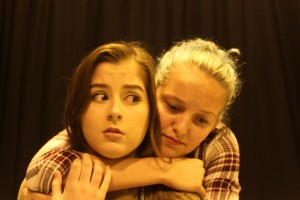
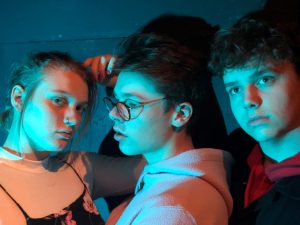
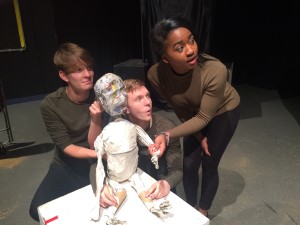
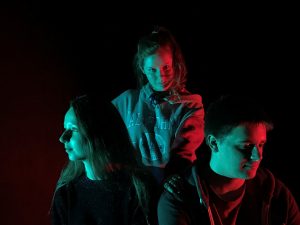
Performing Arts Subject Overview – KS3
At KS3, four ‘strands’ of study are followed: Music, Acting, Musical Theatre and Dance. These four strands are all offered by extension as a BTEC in Performing Arts/ Music at KS4, as well as GCSE Music and Drama as a separate offer, leading to Advanced Level 3 courses in Music and the Performing Arts at both BTEC and A Level Post 16.
Rationale For Provision
Across all four strands, throughout Key Stage Three, students develop their abilities in comprehension and communication. They work both independently and alongside others and learn to take risks with the development of their ideas. Students learn performance skills and about the way in which expression and space help to show meaning to an audience. They learn to analyse their work and the work of others and how to put target setting into practise.
Assessment will take place throughout the year where students will accumulate a series of skill sets which will be tested formally and which will form a bank of results leading to one unique, overall grade. Performing Arts develops students’ speaking and listening skills, confidence and understanding of the world around them. It also allows for physical expression and use of imagination and develops students’ trust in their creative instinct.
In Performing Arts, students use themes, issues and texts to examine a diverse range of social, political and cultural contexts. This, in turn helps them to understand the society in which they are currently living and the nature of the human condition. Performing Arts is an inclusive subject where all students are given the opportunity to develop and learn in a safe and structured environment where originality and creativity flourish. All students are guided to develop and extend their vocabulary to improve analysis within the lessons. Oriel Performing Arts teachers and students are fully committed to building on an already exciting and supportive department where all students feel safe and relaxed about achieving, trying their best and therefore reaching their full potential.
We provide a high quality music education alongside an array of extra-curricular activities and performance opportunities. We also boast a vibrant team of peripatetic staff who support all areas of the curriculum. In addition, we provide dedicated concert evenings, workshops and specialist sessions after school, which prepares students for life in the music industry. These students are always involved in the sound and lighting side of all concerts as well as being given ‘real life’ opportunities to develop their skills. We regularly perform and work with our feeder schools. The curriculum covers an exciting range of units, which develops students’ musical understanding, listening and analytical skills, performance skills (both solo and ensemble), compositional skills and their ability to evaluate their own and others work.
At Key Stage 3 all classes are taught in mixed ability groups.
Schemes of Work – KS3
Acting, Musical Theatre and Dance
Year 7
| Term | Term's Collective Title/Theme | Acting | Dance/Musical Theatre |
|---|---|---|---|
| 1a | Matilda End of unit trip to the musical of Matilda | People, Place and Problem How story and character are shown through people, place and problem. Still image, Mime, Facial Expression, Body language, Stage configurations, Roleplay. | People, Place and Problem To choreograph and perform a simple movement sequence in character to a piece of music from Matilda. Count of 8, canon, mirroring, characterisation, beats. |
| 1b | Halloween Season | Dark Wood Manor To explore a haunted manor through whole class improvisation and teacher in role. Hot seating, whole class in role, body as prop, still image, mime. | Dark Wood Manor To choreograph a whole class musical number of 'Thriller'. Count of 8, canon, ensemble, improvisation, characterisation, taking direction. |
| 2a | When in Rome | Commedia Dell'arte To know the stock character types and create comedy through their mannerisms. Stock charactersm movement, body language. | Commedia Dell'arte To learn a selection of Italian Folk Dance steps and perform them within a devised scene with Italian Folk Music. |
| 2b | More Than Words | Living House To know what physical theatre is and how it can be used to tell a story. Body as prop, ensemble, beats. | Living House Creating a physical theatre piece that is informed by the tempo, atmosphere and beat of a piece of music. |
| 3a | From the Middle East | The Boy at the Back of the Class To explore the contexts around refugees. Multirole play, physical theatre, still image, mime. | The Boy at the Back of the Class To learn a selection Syrian Folk Dance steps to put into a devised performance. https://www.youtube.com/watch?v=3Iec81_2sHw |
| 3b | Japanese Art | Shadow Puppetry To be able to perform a story through verbal communication and the absence of light. Pitch, place, tone. | Shadow Puppetry To learn Japanese Folk Dance steps and perform them within a Shadow Puppetry performance alongside Taiko. |
Year 8
| Term | Term's Collective Title/Theme | Acting | Dance/Musical Theatre |
|---|---|---|---|
| 1a | "A Drum A Drum, Macbeth Doth Come" | Macbeth To perform select scenes in traditional Shakespeare conventions and to be able to translate and modify to a modern audience. Tension, stage conventions, voice, body language, Language, devising, stage combat. | Macbeth To create a ritualistic dance that represents the witches in 'Macbeth', which fits the beat, rhythm and call and response of their piece, recorded while studying Samba Bateria. |
| 1b | The Greatest Showman | The Story of P.T Barnum To explore the true story of 'TGS' and circus art forms. Cross cutting, naturalism, body language, facial expressions, gesture. | The Story of P.T Barnum To create a routine to a section of 'The Greatest Show'. Verse, chorus count of 8, canon. |
| 2a | Silent Movie End of unit trip to The Show That goes Wrong. | Slapstick To explore how physical comedy is made through nonverbal slapstick skills. Stock characters, mime, exaggeration, stage combat, slapstick moves. | Slapstick To explore how physical comedy is made through nonverbal slapstick skills. Stock characters, mime, exaggeration, stage combat, slapstick moves. |
| 2b | The Roaring 20's | Bugsy Malone To explore the prohibition era through this comical musical. Accent, tone, pitch, pace, pause, tension, facial expression, set. | Bugsy Malone To learn Charleston steps and create a routine in it's style. To create a character led movement piece of 'Bad Guys' |
| 3a | Pop Art | Soap Opera To understand the conventions and importance of Soap Opera. Melodrama, stock characters, exaggerations, scene structure, stage combat, conventions. | Soap Opera To learn elements of Street Dance in the style of 'Diversity' and choreograph a short performance in this style. |
| 3b | British Empire Impact | Noughts and Crosses To explore segregation through this story, whilst analysing a script, to better inform acting choices. Script analysis, cross cutting, still image, naturalistic acting juxtaposition. | Noughts and Crosses To learn elements of afrobeat and put them into a scene from this play. |
Year 9
| Term | Term's Collective Title/Theme | Acting | Dance/Musical Theatre |
|---|---|---|---|
| 1 | For the Big Screen | Acting for Camera - DNA To develop naturalistic acting skills and to plan, direct and film with newly acquired acting and camera skills. Given circumstances, Foley Artistry, camera angles, hitting a mark, monologue, duologue. | Acting for Camera - DNA To look at a selection of successful dances from social media, locate what makes them effective, and plan, direct and shoot a music video intended for social media. |
| 2a | Hamilton End of unit trip to the musical of Hamilton. | Civil War To explore key events of Alexander Hamilton's life and the American Civil War. Devising, set design, whole class improvisation, physical theatre. | Civil War To choreograph a routine to either a character led rap group number or a dance number from 'Hamilton'. |
| 2b | Urban Night Life | Bouncers To perform a fast-paced multirole comedy. Multirole play, exaggeration, chorus, characterisation, whole class improvisation. | Bouncers To choreograph a comical dance routine, using cliche dance moves seen from content creators online. This will fit into a scripted scene that students will perform. |
| 3a | Surrealism | Metamorphosis To explore a surrealist allegory and the skills necessary to perform it in this style. Physical Theatre, whole class improvisation, set building, ensemble. | Metamorphosis To explore surrealist movement styles and create a routine that explores Gregor's experience. |
| 3b | Showcase | The Airport To devise an episodic performance, using Brechtian skills. Episodic structure, multirole play, improvisation, placards, symbolic prop. | The Airport Students will need to choreograph a freestyle performance into their show, which will be inspired by the stimulus of 'The Airport'. |
Music
Music is taught to Key Stage 3 students once per fortnight and our use of Music Technologies, such as Logic Pro and Garageband are fully embedded into our schemes of work. Students follow a programme of study that focuses on and develops the key skills of:
- Performing
- Singing
- Composing
- Improvising
- Appraising
- Building confidence and teamwork skills
Our curriculum map centres around the National Curriculum requirements and incorporates music from a wide range of styles, cultures and historical periods. Students are encouraged to develop their musical creativity through a range of practical activities which utilises their individual skills, imaginations and abilities. Activities both in the classroom and at extra-curricular level also allow students to develop and refine their knowledge, understanding and appreciation of music. Students will use a range of instruments throughout Key Stage 3 including keyboards, guitar, ukulele, various percussion instruments, and voice. Music Technology, which we run on our Mac Computers is used to enhance and facilitate learning and students will learn to sequence MIDI, record and process audio, as well as mixing skills on a range of software and hardware. In Year 9, students start to further refine their skills and knowledge as they progress towards the ‘Step up to GCSE’ unit towards the end of the academic year.
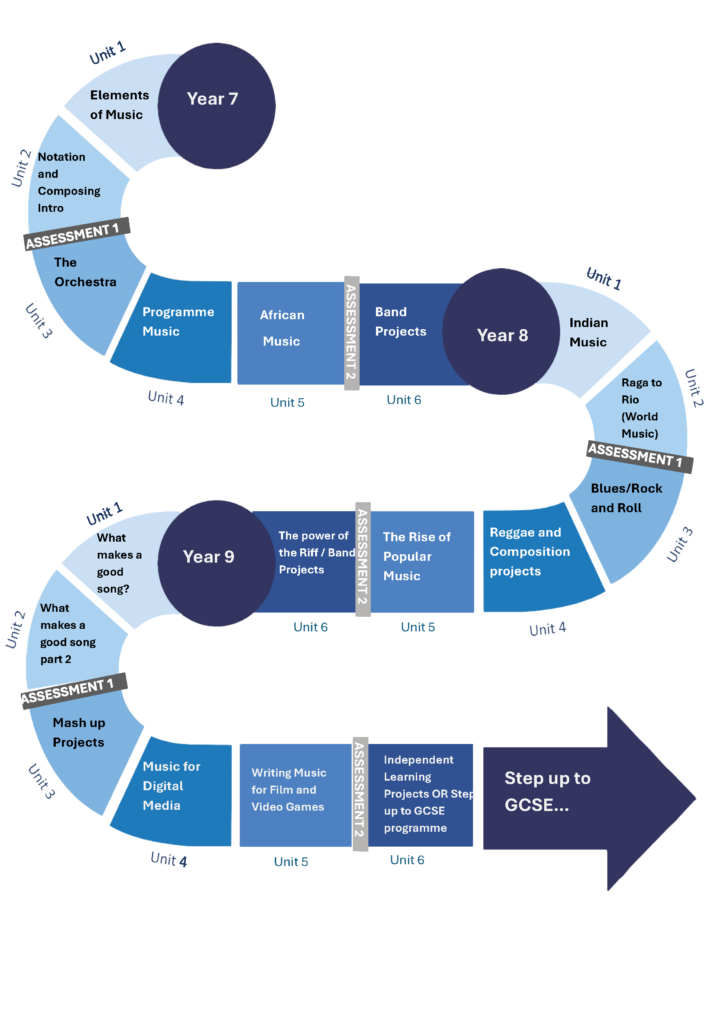
Below is an overview of the topics we teach throughout each year group:
Year 7
| Autumn I | Spring I | Summer I |
|---|---|---|
| Musical Elements - Key Elements of Music: Tempo, Texture, Tonality, Articulation, Dynamics, Pitch, Pulse, Melody, Rhythm - Learning Rhythm notation through use of Kodaly strategies - What is a contrast in music? - Sight singing intro - Singing and performing 'By the Waters' to demonstrate understanding of reading notation and sight singing | The Orchestra, Musical Eras and Genres - Composers of the baroque, classical and romantic historical periods - Musical instrumental families and how to recognise them - Which instruments are in each family? - What is timbre? - What are the key characteristics of the three musical eras and how do we recognise them by listening? - Key composers: Mozart and Saint-Saens | African Music - Research projects on African music, history, geography and culture - Djembe workshop, using Toto Africa - Che Che Kule - perform a traditional song on Djembes, from Ghana, to demonstrate call and response - Class assessment: In groups, compose and perform an African piece, demonstrating the use of Call and Response, Ostinato and 2 contrasting sections Assessment Point 2: End of year quiz, demonstrating understanding of all key terms |
| Autumn II | Spring II | Summer II |
| Notation and Composing with the Elements - Understanding how to read notes of the treble and bass clef - Keyboard basics (with hands together) - Chord Basics (Major and Minor) - Performing on keyboards using simple chords as a background - Applying concepts such as Tonality, Texture and Structure into Composition and Performance work - Understand concept of Ostinato and how to compose using one - Assessment Point 1: Composing a piece using the keyboards that reflects both ostinato and contrasting musical elements. | Programme Music and further Composition - Introduction to Programme Music and research projects - Listening and Appraising set work 'Carnival of the Animals' - Concept of Leitmotif and how it is applied in music for film, games, TV - Compose a Leitmotif (using Ostinato concepts and framework) - Compose music to a set brief or visual stimulus | Band Projects - Achy Breaky Heart Listening Activity and Introduction to lyrics - Introduction to the Ukelele - Learn the chords, either on Ukelele or Keyboards - Cover Songs listening and comparison activities, to practice and apply appraisal skills - Whole class sing along with lyrics - Rehearse full song in groups of 4 Assessment: Performance of band projects (singing and playing) and written evaluation on Word document |
Year 8
| Autumn I | Spring I | Summer I |
|---|---|---|
| World Music - Reintroduce elements of music and instrument families - Indian Music Research Projects (Instruments culture and history) - Listening activities using describing music charts - complete on Word - The Raga: Intro and how to compose one - Raga composition projects on GarageBand | Samba / Blues / Rock and Roll - Round off Samba work - Students to put their own Samba performances together using instruments - Blues research projects (instruments, history and culture) - Blues listening activity using describing music charts - Intro to 12 bar blues and perform on keyboards Class assessment: 12 Bar Blues compose and perform task | Rise of Popular Music - Pop Research Projects (Historic timeline, Pop music roots, instruments, key artists, different sub-genres) - What makes a good Pop song? Focus on structure, chords, lyrics riffs and hooks - Pop listening activities - Composing a basic riff Assessment Point 2: End of year listening quiz |
| Autumn II | Spring II | Summer II |
| World Music - Raga to Rio - Complete Indian Compositions - Samba research projects (instruments, culture and history) - Listening Activities using describing music charts - complete on Word - Compose a Samba inspired piece on GarageBand - needs to feature 3 Samba instruments and must include 5 tracks Assessment Point 1: Samba performance project - Mas Que Nada - learn the riff on keyboards and play with chords | Reggae and Composition Projects - Intro to Reggae and research projects (instruments, culture, characteristics history) - Singing and listening task (3 Little Birds, Bob Marley) - Demonstrate syncopation (offbeat rhythms) - Recap chords / Major / Minor - Class assessment: Reggae composition projects, Compose and perform a Reggae song, including your own lyrics | Band Projects - Blinding Lights by The Weeknd - Introduce the song - Whole class sing along/learn lyrics - Learn the riff - Learn the chords (Em, Bm, D, A) - Band planning lesson - planning sheets - Appraising and Listening practice using describing music charts Class Assessment: Perform Blinding Lights, should include singing and use at least 2 instruments |
Year 9
| Autumn I | Spring I | Summer I |
|---|---|---|
| What makes a good song? - Listening activities - Re-introduce concept of riffs and hooks - How to compose a riff with accompaniment (use concept of Ostinato) - Logic Pro tutorial - Practice composing a riff to a set brief - Demonstrate chords and recap major/minor - Refresh knowledge of instruments and advanced musical elements | Mash up Project - Logic Pro - Introduce concept of mash ups, remixes and cover songs: what is the difference? - Listening activities around above concepts - Logic Pro: how to mix, splice and mash up - Mash up projects - students should select minimum of 3 tracks, to then splice (cut up) and build their own song (minimum 3 minutes long) in Logic Pro Written evaluation of the process used, using key terminology | Scoring for Trailers - Logic Pro recap: how to use for film scores - Appraise 4 scenes from contrasting movies and use describing music charts - complete on a Word document - Introduce trailer scoring task - work in pairs - Create storyboard for chosen trailer Assessment Point 2: Compose a score to chosen trailer, including use of FX, folie and underscore. Written evaluation and peer assessments |
| Autumn II | Spring II | Summer II |
| What makes a good song 2 - Advanced tutorials of Logic Pro - Compose your own Pop song in groups of 4-5 - Perform your pop song (in groups) - requires instruments, riff, lyrics, verse chorus structure, OR 'Somebody that I used to know' by Gotye Assessment Point 1: Performance based assessment and individual written evaluations using music terminology | Music for Digital Media - Research Projects, Film composers, key soundtracks, history of film, techniques used, use of technology - Mickey Mousing, Leitmotif and key film/game music techniques - Listening activity - Star Wars or similar - Writing a storyboard (discuss timings/hit points, etc.) Assessment: Use Logic Pro to compose to a visual stimulus; a short 1-minute piece reflecting the characteristics of one of 5 prescribed visual themes | This half term. students will have two options: Option 1: Independent Learning Projects Students choose to complete a minimum of 4 music related tasks from a list of 20 by the end of term, which all reflect and implement their prior learning throughout KS3. These will be saved to their individual computer drives. Option 2: Step up to GCSE Alternatively, students who have opted for GCSE Music can follow a 'Step up to GCSE' program, where we start to introduce the key concepts of the course ahead. |
Pathways at KS4
GCSE Music (Eduqas)
| Component 1 - Performing | 30% | • You must perform 1 ensemble and then a second performance of either a solo or another ensemble. • The performances have to add up to 4 – 6 minutes combined. • It is teacher examined and then moderated. |
| Component 2 - Composing | 30% | • You must compose 2 pieces of music. • One piece is to a brief set by the exam board, the other is in the style of your choice. • Both compositions must last 3 – 6 minutes. • It is teacher examined and then moderated by the exam board. |
| Component 3 - Exam | 40% | The Appraising exam lasts for 1 hour and 15 minutes. You are assessed on 4 areas of study: AOS1 – Musical Forms and Devices AOS2 – Music for Ensemble AOS3 – Film Music AOS4 – Popular Music Within this there are 2 set works you have to learn. The set work for AOS1 is Badinerie, from the Orchestral Suite No 2. in B minor by J.S. Bach. The set work for AOS4 is Africa by Toto. The rest of the exam is unheard but will test your understanding of the musical elements, your listening skills and your general theory. |
Pearson BTEC Level 1/2 in Performing Arts
Component One: Exploring the Performing Arts (30%)
To develop as a performer you will need a broad understanding of performance work and influences. To gain a realistic overview of performing arts repertoire, you will learn about the skills and techniques of singing, dancing and/or acting. This component will help you to understand the requirements of being an actor, dancer or musical theatre performer across a range of performances and performance styles. You will develop knowledge and understanding of a range of performance styles. You will look at elements such as roles, responsibilities and the application of relevant skills and techniques. You will broaden your knowledge through observing existing repertoire and by learning about the approaches of practitioners, and how they create and influence performance material. This component will give you an understanding of practitioners’ work and the processes and practices that contribute to a range of performance styles. You will develop transferable skills, such as research and communication, which will support your progression to Level 2 or 3 vocational or academic qualifications.
Component Two: Developing Skills and Techniques in the Performing Arts (30%)
Working as a performer requires the application of skills, techniques and practices that enable you to produce and interpret performance work. You will communicate intentions to an audience through a variety of disciplines such as acting, dancing and musical theatre. In this component, you will develop performance skills and techniques. You will have the opportunity to specialise in one or more of the following disciplines: acting, dance, musical theatre. You will take part in workshops and classes where you will develop technical, practical and interpretative skills through the rehearsal and performance process. You will work from existing performing arts repertoire, applying relevant skills and techniques to reproduce the work. Throughout your development, you will review your own progress and consider how to make improvements. Developing performance skills and techniques will enable you to consider your aptitude and enjoyment for performing arts, helping you to make informed decisions about what you study in the future. This component will help you to progress to Level 3 qualifications in performing arts, where skills and techniques are looked at in more detail. Alternatively, you may want to progress to other Level 3 vocational or academic subject areas. This component has many transferable qualities, for example communication skills and teamwork, which will be valuable whatever you decide to do.
Component 3: Performing to a Brief (40%)
Live performance can happen in a number of places and for a range of reasons. For example, you may perform in a traditional performance space to an audience to communicate ideas about a particular theme or issue, or you may be part of a touring group that takes a performance to a community setting, such as a local school, to teach a young audience a safety message. In this component, you will have the opportunity to respond to a brief. You will be given a brief that outlines the performance requirements and that asks you to consider your target audience and to start the creative process by using the given stimulus included in the brief. Working as part of a group, you will develop your ideas for a workshop performance and apply your skills and techniques to communicate your creative intentions to your audience. The performance skills you will use will vary depending on features such as your performance discipline and the content of the work, your venue and target audience. The work may involve improvisation, vocal work, movement techniques or assisting with audience involvement. The group performance may involve some solo or small-group work or it may be an ensemble piece. You will have the opportunity to inform the performance using existing or newly developed skills, adapting them to suit the performance. This component will help you with progression to Level 2 or 3 vocational or academic qualifications. This component will also enable you to develop transferable skills, such as communication and teamwork, which will help you to progress onto further study.
Pearson BTEC Tech Award in Music Practice
Component One: Exploring Music Products and Styles (30%)
- Explore different styles and genres of music.
- Take part in practical workshops to understand stylistic features and characteristics.
- Learn about the different products the music industry.
- Develop techniques in realising musical products.
Component Two: Music Skills Development (30%)
- Reflect on their progress, and on areas for improvement.
- Choose a job role and explore the skills needed to fulfill it.
- Develop a range of skills.
- Apply skills and techniques in a music performance, creation or production.
Component Three: Responding to a Commercial Music Brief (40%)
- Choose an area of the industry that excites them (composer, performer, or producer).
- Explore the brief and come up with possible responses and ideas.
- Use relevant resources, skills and techniques to develop and refine musical material.
- Present their final response (solo or in a group)
- Review and reflect their approach to the brief and their final outcome.
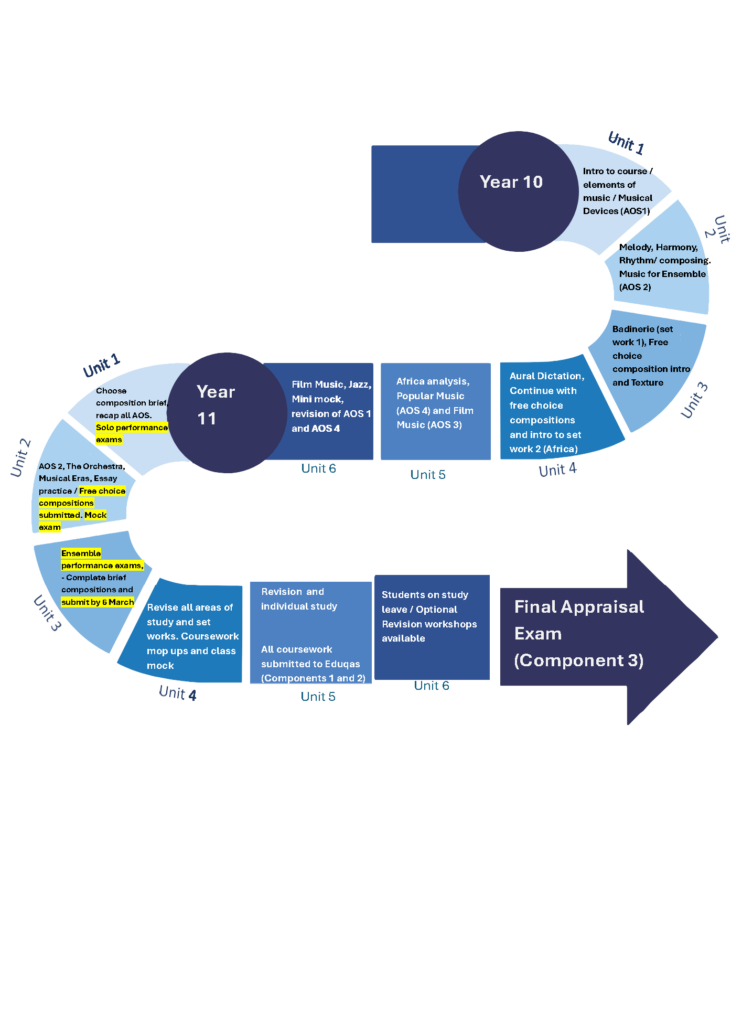
Pathways at Key Stage 5
Pearson BTEC Level 3 National Extended Certificate in Music Performance
This course is aimed at students who want to continue their education through applied modular learning, with a focus on Performance as a specialism. This qualification is equivalent in size to one A Level and aims to provide a coherent course of study, learning about performance and the music industry. It is designed to be taken alongside other Level 3 or A Level qualifications.
Students are required to have a minimum of a Level 2 qualification in a Music related subject, either as a GCSE or equivalent. Alternatively, this course would be suitable for students without a Level 2 qualification, but they can evidence a competency of at least Grade 5 in their chosen instrument.
Students taking this qualification will study three mandatory units:
• Unit 1: Practical Music Theory and Harmony
• Unit 2: Professional Practice in the Music Industry
• Unit 3: Ensemble Music Performance.
Students then choose one optional unit. These have been designed to support progression to more specialist music courses in higher education and to link with relevant occupational areas. The optional units available are:
- composing music
- music performance session styles
- improvising music
- solo performance
What employability skills can be developed through this course?
In the BTEC National units, there are opportunities during the teaching and learning phase to give learners practice in developing employability referring to skills in the following three main categories:
• cognitive, critical thinking and problem-solving skills: applying expert and creative solutions through use of systems and technology
• interpersonal skills: communicating, working collaboratively, negotiating and influencing, self-presentation
• inter-personal skills: self-management, adaptability and resilience, self-monitoring and development
• the ability to learn and research independently
• the ability to give presentations and be active team members.
• effective writing
• analytical skills
• creative development and performance skills
• preparation for assessment methods used in degree programmes
For further information regarding this course, please find the specification at the link below: https://qualifications.pearson.com/content/dam/pdf/BTEC-Nationals/Music/2017/Specification/9781446928110-btec-nat-extcert-music-spec-prepubfinal.pdf
Peripatetic Music Lessons
For Key Stage 5 students, instrumental lessons are strongly encouraged, as the course is mostly performance-based, this will greatly supplement and support their progress.
All students have the opportunity to learn a musical instrument or to participate in singing lessons. Peripatetic music teachers from West Sussex Music offer a wide range of musical opportunities and further details about the cost of these lessons and how to apply can be found at: https://www.westsussexmusic.co.uk
Students who study an instrument will be encouraged to use it within the school curriculum and enhance their studies further by following a very individual learning journey throughout their music lessons.
Pearson BTEC Level 3 National Extended Certificate in Performing Arts
Full details available on request.
The content of this qualification has been designed for post-16 learners with an interest in performing arts who want to continue their education through applied learning, and who aim to progress to higher education. The qualification is equivalent in size to one A Level and gives a broad introduction to the performing arts sector. Learning throughout the course places emphasis on core knowledge and fundamental skills which are transferable across other sectors (including communication, presentation, physical and creative skills). The qualification provides the knowledge, skills and understanding that will prepare learners for further study or training. Learners taking this qualification will study three mandatory learning and teaching modules including:
– Understanding of the work of influential practitioners to inform their own work and practice
– Practical skills and technique development in various performance disciplines such as acting, dance, musical theatre and physical theatre
– Group performance, where learners will develop the essential psychomotor and affective skills essential for the performing arts.
Learners select one optional unit to support their choices in progression. These units cover acting, dance and musical theatre topics.
Examples of the optional units include:
- Unit 8: Classical Ballet Technique
- Unit 11: Street Dance Technique
- Unit 19: Acting Styles
- Unit 27: Musical Theatre Techniques
Learning Outside the Classroom
The Performing Arts Department also offer opportunities for students to take part in a range of extra-curricular activities.
Many students take every opportunity they can to perform!
Upcoming / ongoing extra-curricular activities in Performing Arts to include:
- Production of Little Shop of Horrors, Autumn 2025
- Oriel Extras, a student run company, to maintain an ongoing series of events
- National Youth Theatre entries 2025-26
- Friends of Frantic Assembly
- National Theatre Connections Programme 2025-2026 at Trinity Theatre, Tunbridge Wells
- Lets Dance 2026
- Theatre Trips for all KS3 groups
- Easter Concert 2026
- Big Night Out Cabaret 2026








